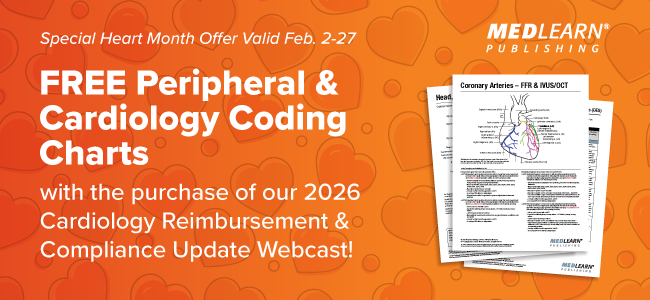Procedures involving lower extremities are often highlighted as a problem area for many CPT coders and healthcare compliance and regulatory professionals. Applying them correctly can be an area of confusion for many professionals. Let’s take time to examine and break down some of the details surrounding codes 93925 and 93926 for a duplex scan of the lower extremity arteries or arterial bypass grafts.
How is this code used?
Understand that real-time and Doppler studies are performed on the arteries of bilateral lower extremities. What does the scan encompass? The scan includes the full length of the common femoral, superficial, and popliteal arteries. Should the patient’s signs and symptoms warrant, the iliac, deep femoral and tibio-peroneal arteries should be included. It is important to assess Blood pressure (systolic) for this procedure. Report these codes under the circumstance that evaluation is performed of an arterial bypass within the lower extremity including the surrounding or adjacent vessels.
- 93925 Duplex scan of lower extremity arteries or arterial bypass grafts; complete bilateral study
- 93926 Duplex scan of lower extremity arteries or arterial bypass grafts; unilateral or limited study
Do duplex scans require both flow Doppler and spectral analysis?
Yes. All duplex scans require both color flow Doppler and spectral analysis. When only one of these portions of the study are performed, it should not be coded as a duplex procedure.
“Assessing flow with color, recording a waveform and reporting the findings in a medically indicated examination are the key elements to look for in a report.”–Ultrasound Coding User’s Guide
Is it necessary to document the spectral analysis and color flow?
To assign the duplex codes, both spectral analysis and color flow must be documented. Duplex scans are a combination of ultrasound imaging, plus velocity measurements of blood flow (spectral analysis), and color flow.
What terms specify spectral analysis?
Terms indicating spectral analysis include:
- acceleration rate
- monophasic biphasic or triphasic waveforms
- peak systolic velocity
- resistive index (RI) velocity
- waveform analysis
- pulsed Doppler
- spectral Doppler
Can noninvasive vascular diagnostic Doppler studies be reported with gray scale imagine?
Noninvasive vascular diagnostic Doppler studies may be reported with grayscale imaging codes when a thorough Doppler study is performed. However, when color Doppler is used only for structure identification (i.e., to determine whether or not a structure is vascular), this does not indicate that a duplex study CPT code should be used. Clinical Examples in Radiology, Volume 11, Issue 3, Summer, states that “if a grayscale evaluation of the organ involved is performed in addition to the duplex Doppler examination, each procedure or service should be reported separately or at least have a separate paragraph within the report.”
Could modifiers be required when reporting these codes?
It is best to check and verify if an NCCI-approved modifier may be required to indicate that a separate and distinct procedure was performed when Doppler studies are reported with some gray scale codes. Additionally, ensure that a thorough explanation of medical necessity is provided by the radiologist when a Doppler study is performed without an order from the referring physician. (Source: Clinical Examples in Radiology, Volume 14, Issue 1, Winter 2018).
What about modifier use for hospital-based services regarding the CMS-1500 claim form?
For hospital-based services, on the CMS-1500 claim form, assign modifier 26 to describe the professional component. For Medicare patients, hospitals will not need to assign the TC modifier as billing on the UB-04 claim form implies billing for the “technical component.”
If performed in a physician-owned, non-facility setting in which the physician owns the equipment, employs the staff, and performs and reads the study, no modifier is required as this constitutes global billing.
Other noteworthy tips and guidelines:
- It is necessary to report code 93925 for a complete bilateral study. At a minimum, a complete exam consists of the full length of the common femoral, superficial femoral, and popliteal arteries.
- When all required elements are not documented or a follow-up study is performed, report code 93926.
- Understand that codes 93925 and 93926 are imaging studies, whereas 93922–93924 are non-imaging studies.
- For iliac artery imaging only, assign code 93978 or 93979 as appropriate.























